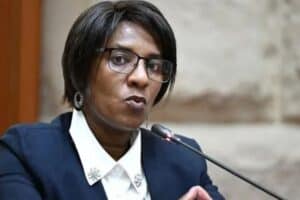Political analyst Prince Mashele and Right2Know's Ghalib Galant took issue with her statements, saying they're not buying 'this media collectivism'.

Public Protector Busisiwe Mkhwebane believes the media as a whole is biased against her in an organised way after she started “touching the untouchables”.
“There is collusion of media houses,” Mkhwebane told a panel discussion at the launch of the University of the Western Cape’s Media Mind Blast programme. The topic under discussion was “How the South African media told [her] story.”
She added that she knows that journalists “sit and discuss” how to report on her.
“Indeed, all of them [media houses], they have ulterior motives,” she said. “At the end of the day, there is this biasness.”
“I put them all in the same basket.”
She also said analysts “just talk” to further the narratives created by the media.
She said her issues began when she “touch[ed] the untouchable” and released her ABSA/Bankorp-report.
“I’m not attacking the independence of the Reserve Bank, but I’m saying it must serve the poor, marginalised masses,” she said.
She also said her report on the so-called “rogue unit” (which implicated State Enterprises Minister Pravin Gordhan – she didn’t mention him) was based on evidence.
“You are touching people you are not supposed to have touched,” she repeated. “I know things I’m not supposed to know of them.”
She said she is glad certain information recently got leaked.
Also on the panel was political analyst Prince Mashele and Right2Know’s Ghalib Galant.
Mashele wasn’t having Mkhwebane’s remonstrations.
“I’m shocked by you!” he said to Mkhwebane.
“It is their job to ask pressing questions,” he said of the media.
He took issue with her painting all media with the same brush, saying there is diversity in the media.
“Is it fictional the public protector has been losing cases in court? It’s not fictional.”
He said it cannot be expected of the media not to report when a court finds a public protector’s report to be nonsensical.
“I don’t buy this projection of the public protector as a victim,” he said. “I don’t buy this collectivism of the media.”
Mkhwebane shook her head and took notes on her tablet while Mashele spoke.
He did not sway Mkhwebane, who stuck to her guns.
Galant said: “Is there really a conspiracy to bring down the office of the public protector? I think: no.”
Galant warned against the dangers of “Trumpism” by making the whole mainstream media out to be purveyors of fake news.
There was much support for Mkhwebane when the audience, mostly students, got an opportunity to voice their take.
The first speaker referred to Mashele as a “Stratcom agent who has been insulting the public protector in full view of everyone”. He also commended Mkhwebane for “staying strong for facing the cabal head-on”.
“What I want to say to umama public protector is that you are under attack because you are starting to peel away at white monopoly,” said another speaker from the audience.
President of the UWC students representative council Azania Tyhali said when the mainstream media is compared to social media, it is clear to see the media’s bias.
“In this country, there are no journalists.”
“Advocate Mkhwebane is touching the running dogs of imperialism,” she said.
In conclusion, Mkhwebane said the media needs to approach each story with an open mind and report factually.
“I welcome constructive criticism,” she said, adding that she is aware that “negative news and propaganda” sells.
After proceedings, she chatted with some of the students and posed for photos with them.
For more news your way, download The Citizen’s app for iOS and Android.






